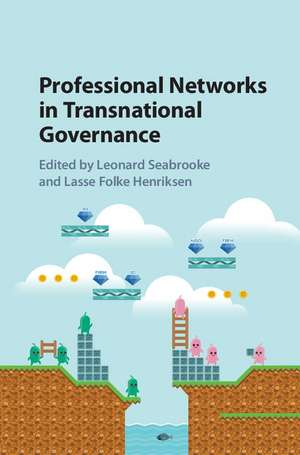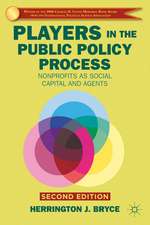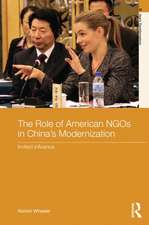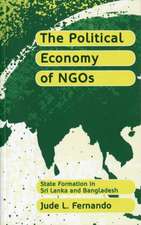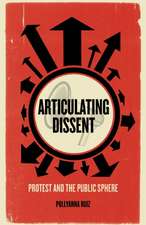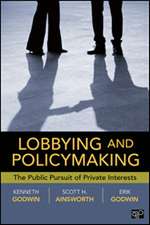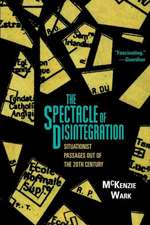Professional Networks in Transnational Governance
Editat de Leonard Seabrooke, Lasse Folke Henriksenen Limba Engleză Hardback – 11 oct 2017
Preț: 755.54 lei
Preț vechi: 878.54 lei
-14% Nou
Puncte Express: 1133
Preț estimativ în valută:
144.57€ • 151.25$ • 120.10£
144.57€ • 151.25$ • 120.10£
Carte tipărită la comandă
Livrare economică 02-16 aprilie
Preluare comenzi: 021 569.72.76
Specificații
ISBN-13: 9781107181878
ISBN-10: 1107181879
Pagini: 362
Dimensiuni: 155 x 235 x 24 mm
Greutate: 0.63 kg
Editura: Cambridge University Press
Colecția Cambridge University Press
Locul publicării:New York, United States
ISBN-10: 1107181879
Pagini: 362
Dimensiuni: 155 x 235 x 24 mm
Greutate: 0.63 kg
Editura: Cambridge University Press
Colecția Cambridge University Press
Locul publicării:New York, United States
Cuprins
Part I. Frames and Methods: 1. Issue control in transnational professional and organizational networks Leonard Seabrooke and Lasse Folke Henriksen; 2. In the 'field' of transnational professionals: a post-Bourdieusian approach to transnational legal entrepreneurs Yves Dezalay and Michael Rask Madsen; 3. Studying elite professionals in transnational settings Brooke Harrington 4. Networks and sequences in the study of professionals and organizations Lasse Folke Henriksen and Leonard Seabrooke; Part II. Professionals and Non-Government Organizations: 5. Contested professionalization in a weak transnational field Ole Jacob Sending; 6. The Ford Foundation: building and domesticating the field of human rights Wendy H. Wong, Ron Levi and Julia Deutsch; 7. Accounting-NGO professional networks: issue control over environmental, social and governance reporting Jason Thistlethwaite; 8. All the trader's men: professionals in international trade policymaking Matthew Eagleton-Pierce; 9. Professional activists on tax transparency Duncan Wigan and Adam Baden; Part III. Professionals and International Organizations: 10. Esteem as professional currency and consolidation: the rise of the macroprudential cognoscenti Andrew Baker; 11. Treating market failure: access professionals in global health Adriana Nilsson; 12. Professions and policy dynamics in the transnational carbon emissions trading network Matthew Paterson, Matthew Hoffman, Michele Betsill and Steven Bernstein; 13. Quasi-professionals in the organization of transnational crisis mapping John Karlsrud and Arthur Mühlen-Schulte; Part IV. Professionals and Market Organisations: 14. Global professional service firms and institutionalization James Faulconbridge and Daniel Muzio; 15. Global professional service firms, transnational organizing and core/periphery networks Mehdi Boussebaa; 16. Professional management consultants in transnational governance Bessma Momani; 17. Professional and organizational logics in internet regulation James Perry and David Kempel; 18. Conclusion: issue professionals and transnational organizing Lasse Folke Henriksen and Leonard Seabrooke.
Recenzii
'On transnational issues as diverse as carbon emissions, flu outbreaks, food security, and human rights, networks of skilled professionals coordinate actions and responses across a welter of competing organizations. This widely distributed, lateral form of influence has been largely unexplored until now. Seabrooke and Henriksen assemble a notable cast of contributors to examine how a new regime of governance is orchestrated through professional networks. This impressive volume provides novel insights into how experts shape global issues and create demand for their expertise.' Walter W. Powell, Stanford University, California
'This exceptional book moves research frontiers. It accomplishes the almost impossible. Never losing its clear-headed view of the big picture, Seabrooke and Henriksen step deep into the weeds of governance theory. They conclude that organizational structures and authority mandates matter less than professional strategies to gain control of issues and shape rules and standards. A broad range of politically novel and methodologically sophisticated case studies make theories of rational institutional design and norm entrepreneurship look quaint in the emerging world of governance. A must read.' Peter J. Katzenstein, Walter S. Carpenter, Jr Professor of International Studies, Cornell University, New York
'Professional judgement has always mattered in policy making. Yet, as this volume argues and outlines, in transnational governance the professions may matter more in devising rules, benchmarks and standards, or in exercising their technical and epistemic authority via new governance architectures of networks. This is a compelling set of studies that provides a different and more nuanced conceptual vantage point for social scientists concerned with not only how transnational problems are managed, but also with the wider range of professional actors who seek to define and control them. The book is a 'must-read' for anyone interested in professional network power.' Diane Stone, Centenary Research Professor, Institute of Governance and Policy Analysis, University of Canberra, and University of Warwick
'This exceptional book moves research frontiers. It accomplishes the almost impossible. Never losing its clear-headed view of the big picture, Seabrooke and Henriksen step deep into the weeds of governance theory. They conclude that organizational structures and authority mandates matter less than professional strategies to gain control of issues and shape rules and standards. A broad range of politically novel and methodologically sophisticated case studies make theories of rational institutional design and norm entrepreneurship look quaint in the emerging world of governance. A must read.' Peter J. Katzenstein, Walter S. Carpenter, Jr Professor of International Studies, Cornell University, New York
'Professional judgement has always mattered in policy making. Yet, as this volume argues and outlines, in transnational governance the professions may matter more in devising rules, benchmarks and standards, or in exercising their technical and epistemic authority via new governance architectures of networks. This is a compelling set of studies that provides a different and more nuanced conceptual vantage point for social scientists concerned with not only how transnational problems are managed, but also with the wider range of professional actors who seek to define and control them. The book is a 'must-read' for anyone interested in professional network power.' Diane Stone, Centenary Research Professor, Institute of Governance and Policy Analysis, University of Canberra, and University of Warwick
Descriere
This book provides an original framework to examine how professionals control transnational issues, commonly considered the concern of organizations.
